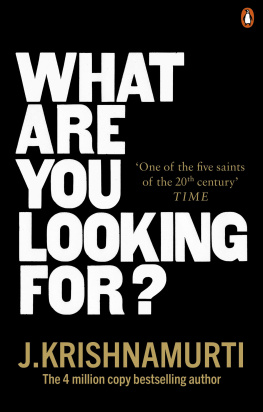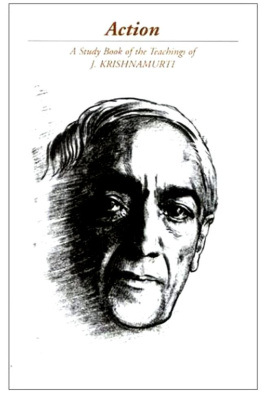Krishnamurti - The Seed of a Million Years
Here you can read online Krishnamurti - The Seed of a Million Years full text of the book (entire story) in english for free. Download pdf and epub, get meaning, cover and reviews about this ebook. publisher: Krishnamurti Foundation India, genre: Religion. Description of the work, (preface) as well as reviews are available. Best literature library LitArk.com created for fans of good reading and offers a wide selection of genres:
Romance novel
Science fiction
Adventure
Detective
Science
History
Home and family
Prose
Art
Politics
Computer
Non-fiction
Religion
Business
Children
Humor
Choose a favorite category and find really read worthwhile books. Enjoy immersion in the world of imagination, feel the emotions of the characters or learn something new for yourself, make an fascinating discovery.

- Book:The Seed of a Million Years
- Author:
- Publisher:Krishnamurti Foundation India
- Genre:
- Rating:3 / 5
- Favourites:Add to favourites
- Your mark:
- 60
- 1
- 2
- 3
- 4
- 5
The Seed of a Million Years: summary, description and annotation
We offer to read an annotation, description, summary or preface (depends on what the author of the book "The Seed of a Million Years" wrote himself). If you haven't found the necessary information about the book — write in the comments, we will try to find it.
The Seed of a Million Years — read online for free the complete book (whole text) full work
Below is the text of the book, divided by pages. System saving the place of the last page read, allows you to conveniently read the book "The Seed of a Million Years" online for free, without having to search again every time where you left off. Put a bookmark, and you can go to the page where you finished reading at any time.
Font size:
Interval:
Bookmark:
The Seed of a Million Years
Copyright 2019 Krishnamurti Foundation Trust Ltd
The Seed of a Million Years
Talks in Madras 1979-80
J. Krishnamurti
CONTENTS
FOREWORD
What is special about this book, and what does its title mean?
For nearly six decades Krishnamurti addressed vast audiences in several parts of the world and, over the years, his Public Talks, as they were called, were made available to readers in various books. Almost up to the end of the 1960s, a Talks series would consist of even twelve talks spread over three or four weeks, and these were sometimes interspersed with meetings at which he answered questions from the listeners. In the seventies and eighties, with advancing age and a tighter schedule, he reduced the series to six or sometimes to four or even two talks.
Whatever be the number of talks in a series, Krishnamurti covered the whole gamut of existence, taking his listeners step by step from an observation of the gross outer world to an examination of the subtle world of the human psyche and from there to an exposition of the world that lay beyond both. He explained the rationale for this sequence: it was important to see clearly first the outer world, as otherwise there would be no criterion for understanding the inner. And after putting ones inner house in order, one could turn to questions such as the meaning of meditation and the nature of a truly religious life; for this reason, he said, he dealt with these themes only at the end of a series of talks.
There were, however, occasional exceptions to this usual formatas seen in this present series of six talks Krishnamurti gave in Madras between 22 December 1979 and 6 January 1980. Striking a most solemn note in the very first talk, he points out that throughout history all civilizations were born out of religion, that is, out of mans quest to find something beyond his life of misery and meaninglessness. He then goes on to speak lyrically of the seed of a million years, the seed of religiosity, that seed moving all through mankindphrases that he was using perhaps for the first time and found in the first, second, third, and sixth talk in this series:
Man... must have asked a million years ago, from the beginning of time, if there is a reality, if there is a truth, if there is something timeless, something that cannot be measured by man. And that inquiry, that seed, is still with us... And during these talks we are going to find out whether it is possible for that seed to grow and flower, multiply and cover the earth. That is the function, the necessity of every man.
The feeling of sanctity, the sense of otherness, which suffuses these talks does not seem to be a random occurrence. It had perhaps to do with the experience he went through before coming to Madras for his talks that year. That he must have regarded it as something extremely profound is borne out by the fact that he himself gave a detailed account of it in the form of a dictation. In her biography The Life and Death of Krishnamurti, Mary Lutyens reproduces this dictation, prefacing it with her words: Before the year was out, K was to undergo another psychic experience, while he was in India. On 21 February 1980, at Ojai, he dictated an account of it... referring to himself in the third person:
K went from Brockwood to India on 1 November 1979. He went after a few days in Madras straight to Rishi Valley. For a long time he had been awakening in the middle of the night with that peculiar meditation which has been pursuing him for very many years. This has been a normal thing in his life. It is not a conscious, deliberate pursuit of meditation or an unconscious desire to achieve something. It is very clearly uninvited and unsought. He has been adroitly watchful of thought making a memory of these meditations. And so each meditation has a quality of something new and fresh in it. There is a sense of accumulating drive, unsought and uninvited. Sometimes it is so intense that there is pain in the head, sometimes a sense of vast emptiness with fathomless energy. Sometimes he wakes up with laughter and measureless joy. These peculiar meditations, which naturally were unpremeditated, grew with intensity. Only on the days he travelled or arrived late in the evening did they stop; or when he had to wake early and travel.
With the arrival in Rishi Valley in the middle of November 1979 the momentum increased, and one night in the strange stillness of that part of the world, with the silence undisturbed by the hoot of owls, he woke up to find something totally different and new. The movement had reached the source of all energy.
This must in no way be confused with, or even thought of, as God or the highest principle, the Brahman, which are the projections of the human mind out of fear and longing, the unyielding desire for total security. It is none of those things. Desire cannot possibly reach it, words cannot fathom it, nor can the string of thought wind itself around it. One may ask with what assurance do you state that it is the source of all energy. One can only reply with complete humility that it is so.
All the time that K was in India until the end of January 1980 every night he would wake up with this sense of the absolute. It is not a state, a thing that is static, fixed, immovable. The whole universe is in it, measureless to man. When he returned to Ojai in February 1980, after the body had somewhat rested, there was the perception that there was nothing beyond this. This is the ultimate, the beginning and the ending and the absolute. There is only a sense of incredible vastness and immense beauty.
Krishnamurti Foundation India is happy to offer this unique series of talks to readers on the occasion of the 125th anniversary of Krishnamurtis birth2019-2020.
1. THE SEED OF A MILLION YEARS
We would like to point out first of all that we are not doing any kind of propaganda for any ideal, for any society, for any organization. We are not trying to convince you of anything, we are not trying to sell you something. But I think we can talk over together, think together, see together, and understand the enormous significance, which we seem to miss, of existence, of our daily life, our confusion, our miseries, our great sorrows, and the corruption that is going on throughout the world. So please bear in mind that, throughout these talks and discussions, we are thinking, working together.
To think together is one of the most difficult things to do because each one has his own opinions, his own prejudices, conclusions, and aspirations. One never meets another who is free from thesefrom his superstitions, from his experiences, from the knowledge he has gathered through books or from some guru. And it is infinitely difficult, except under some great crisis, for us to come together to think out our problems, not only our own problems, but the problems of humankind, of which we are a part. So could we this evening attempt to think together? Because, we are going into the whole structure and nature of the mind, which directs all our lives and shapes our activities, our miseries, our meditations, and our innumerable escapes.
One is likely to agree to think together about somethingabout the nation, about oneself, about what organization to belong to, and so on. To think about something is fairly easy, but to think together is something quite different. I hope you see the point: to think about something and to think together, not about something. That means, can we forget our prejudices, put them aside for a while, if we can, and put aside perhaps permanently our experiences? Because if you have your experience and you cling to that, and I cling to mine, then we will never meet. If you have your conclusions and another has his, it is impossible to think together. So we have to put aside our experiences, our knowledge, our prejudices, our ideals, and superstitions. Then we can talk together, then we can think together, because then our minds are meeting. But if each one of us holds on to his point of view, because he has read so much, or is ignorant of books, or wants a particular answer to his own problem and so on, then it is impossible to think together. That is, you and the speaker are thinking together, not about something, but having the quality of a mind that is capable of putting aside its own particular points of view and opinions and ideals and meeting another who has none of those. Then only is it possible to think together without any kind of pressure.
Next pageFont size:
Interval:
Bookmark:
Similar books «The Seed of a Million Years»
Look at similar books to The Seed of a Million Years. We have selected literature similar in name and meaning in the hope of providing readers with more options to find new, interesting, not yet read works.
Discussion, reviews of the book The Seed of a Million Years and just readers' own opinions. Leave your comments, write what you think about the work, its meaning or the main characters. Specify what exactly you liked and what you didn't like, and why you think so.









